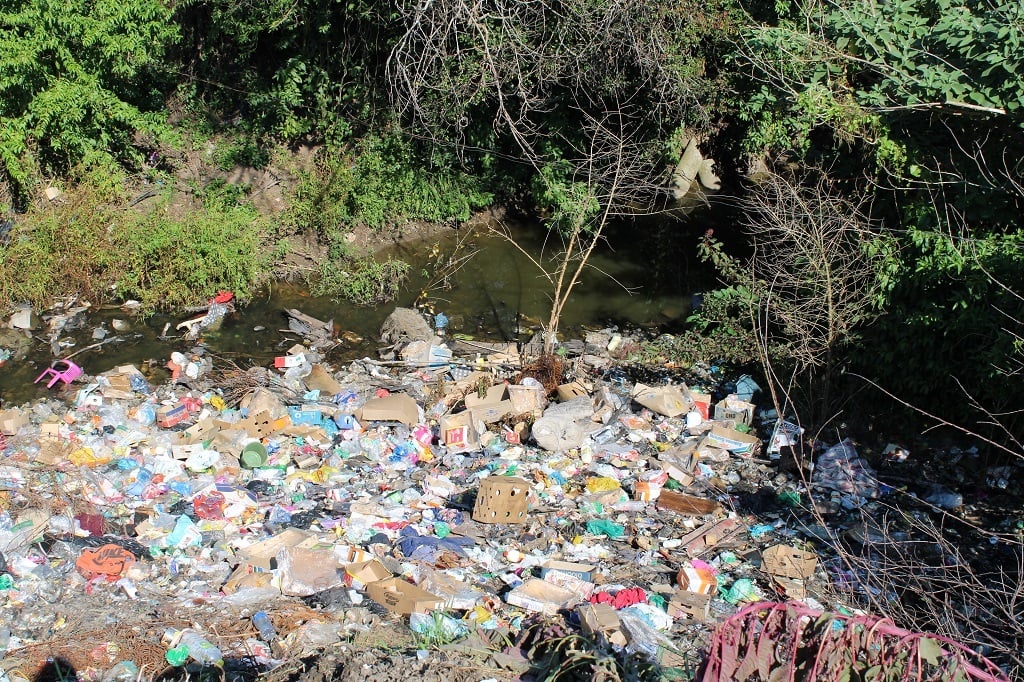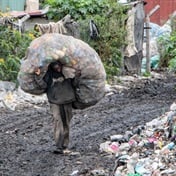
The stark contrast between the refuse collection services found in suburbs and townships compared to their informal settlement counterparts is plain to see, writes Mduduzi Ntongana.
- For climate change news and analysis, go to News24 Climate Future.
As the world honours Earth Day on 22 April, themed "Plastic vs Planet", it is vital to shine a light on an often-overlooked environmental issue - the harsh reality of plastic pollution in South Africa's informal settlements.
In these communities, it's a common sight to witness plastic waste and toxins piling up in makeshift dumping sites and contaminating nearby streams.
Amid South Africa's predominantly urban areas lie informal settlements and townships littered by plastic pollution. From polluted waterways to streets cluttered with uncollected garbage, this environmental injustice takes a heavy toll on the health, dignity, and sustainability of these communities.
Sadly, the government has grown accustomed to generally ignoring the struggles faced by those in informal settlements.
It's alarming how little public outcry there is over the environmental injustices endured by marginalised communities who lack the basic resources needed to manage their waste responsibly.
Residents in informal settlements receive little support when it comes to waste management. They are left without garbage trucks, plastic bags, or communal skip bins, forcing them to look out for themselves, whereas more affluent suburbs have regular refuse collection pickup days.
At the municipal level, in every part of the country, there's a noticeable absence of systematic efforts to address pollution near informal settlements, suggesting a concerning lack of urgency or capability.
READ | SA to call for fund to help end plastic pollution in global treaty
For instance, the Buffalo City Metropolitan Municipality (BCMM) has implemented the Buy-Back Centers strategy, a much-welcomed initiative to stimulate the recycling of plastic in communities and providing livelihood opportunities to local recyclers.
The City, through the community work programme (CWP) and public employment programme (PEP), also has cleaning-up initiatives in key public places in the metro, furthermore providing an income to workers and encouraging community cleanliness.
However, like many other municipalities in the country, there is a lack of resources prioritised for significant environmental rehabilitation projects aimed at cleaning up the plastic pollution in streams, rivers or makeshift dumping sites located near informal settlements.
Areas such as Amalinda Forest Informal Settlement in BCMM, one can clearly identify many instances of neglected streams and open spaces littered with plastic pollution, highlighting the urgent need for comprehensive environmental restoration efforts and increased allocation of resources to tackle this pressing crisis.
A community member from Amalinda Forest expressed how the community feels neglected by the municipality. She stated, "we have no way of disposing waste properly as a community. It's always dirty in parts of the settlement. People dump their waste in open spaces (makeshift dumping areas), and it has to be burnt constantly".
The stark contrast between the refuse collection services found in suburbs and townships compared to their informal settlement counterparts is plain to see. While township and suburban homes benefit from regular garbage collection, informal settlement residents often endure long gaps without this essential service.
Speaking on the current refuse collection by the municipality, she said "the municipal garbage truck used to come and pick up litter for us in the past, but now they no longer come. We do not even have those large bins to make use of. There is a need for those skip bins in the informal settlement."
With limited options, residents resort to burning waste or dumping it in open spaces, worsening the pollution and endangering both their health and the environment.
Environmental organisations like the WWF and UN Habitat have raised the alarm about the urgent need to tackle plastic pollution.
Lives are at stake, and the environment is suffering. Section 24 of the Constitution states that everyone has the right to an environment that is not harmful to their health and wellbeing, yet many in informal settlements are denied this right. Government inaction not only violates constitutional rights, but also perpetuates inequality and injustice.
More attention and resources need to be dedicated to significantly reducing plastic pollution in and around informal settlements. To achieve meaningful progress in this regard, government intervention is crucial, including the provision of essential services such as accessible large waste collection bins and regular garbage collection.
Simultaneously, it is imperative for the community to actively engage in promoting a culture of responsible waste management practices.
READ | OPINION | Closed-door meetings, poor record keeping hamper corporate climate lobbying
Furthermore, collaborative efforts between communities and government can extend to the implementation of large-scale projects and campaigns aimed at cleaning the plastic pollution from streams, rivers, and makeshift dump sites.
The community's involvement can include mobilising volunteers for clean-up events, raising awareness about the detrimental effects of plastic pollution, and actively participating in waste sorting and recycling programmes.
On the other hand, government support would be through the allocation of funding for expertise, creation of job opportunities for recyclers, equipment, and waste management infrastructure.
Therefore, as the world commemorates Earth Day, let us not forget those living in the shadows of plastic pollution, striving for their constitutional rights to a clean and healthy environment. It's time to break down the barriers hindering environmental justice and push for meaningful implementation of environmental rehabilitation projects and strategies.
Through shared responsibility and coordinated action, these joint endeavours can significantly mitigate plastic pollution in waterways and landfills in informal settlements, thus restoring the environment and enhancing the wellbeing of both residents and the ecosystem.
Mduduzi Ntongana is a Programme Officer in the Basic Services Unit at Afesis (a development NGO based in East London). Mduduzi has a background in urban and regional planning and his present work focuses on sustainable settlement development, participatory planning and community development.
News24 encourages freedom of speech and the expression of diverse views. The views of columnists published on News24 are therefore their own and do not necessarily represent the views of News24.




 Publications
Publications
 Partners
Partners












